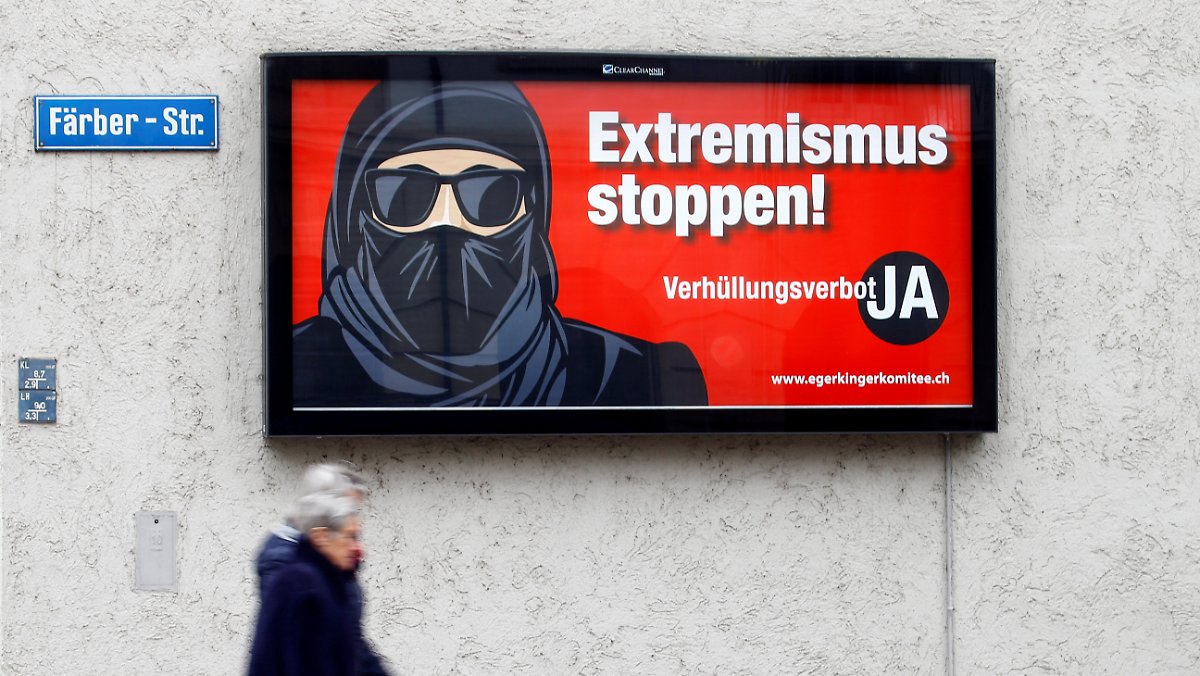
A symbol or a real problem? The Swiss people vote to ban the burqa
Saturday 6 March 2021
A symbol or a real problem?
The Swiss vote to ban the burqa
Written by Cegedim Akyol, Zurich
The construction of minarets has been banned in Switzerland since the referendum. On Sunday, the Swiss decided whether they wanted to make wearing the niqab a crime punishable by law.
Posters hang all over the country: You can see a woman in front of a red background, veiled in a black veil, and wearing black sunglasses. The phrase “Stop Extremism! Prohibit Concealment” reads in capital letters. Another poster shows a woman wearing a nicaparte next to a bare woman with long hair. In addition to the slogan “Liberation instead of physical imprisonment.”
When a “yes to ban the headscarf” is voted in Switzerland on Sunday, the decision will be made primarily on religiously veiled clothing such as the niqab – the face veil – and the burqa – the full-body veil. This is why the initiative is popularly known as the “burqa ban,” although the planned sanctions are not only related to religious niqab, but also disguises during demonstrations, for example.
The initiative aims to ban the wearing of face coverings in public places. These include, for example, traffic and shops, but also great outdoors. Churches and holy places are not affected. Anyone breaking the rule must pay a fine in the future. There should also be no exceptions for tourists, for example from the United Arab Emirates. For this reason, the Swiss Tourism Association fears losses and refuses to ban coverage. “Banning the burqa at the national level may harm Switzerland’s image as an open tourism country,” the association wrote in a press release. However, the initiative does make exceptions when it comes to health. Mouth and nose protection will be allowed, as it is now during the Coronavirus pandemic. The same applies to helmets for safety reasons or face coverings due to climatic conditions, for example when the weather is cold. Carnival masks, which are part of Swiss customs, are also permitted.
The arguments of the proponents are mostly that it is about protecting women’s rights and that liberal values must be defended in Switzerland. In addition, a signal must be sent that political Islam will not be tolerated. On the other hand, opponents argue that a liberal society does not need any dress codes and that the headscarf ban could be enforced at the cantonal level anyway. In addition, there is no problem with the burqa wearer in Switzerland, it is a purely symbolic policy issue.
Only 20 to 30 women wear a niqab
“In enlightened countries like Switzerland, free people look at their faces when they talk to each other,” wrote Annain Liebrand, a member of the conservative right-wing Swiss People’s Party (SVP) and coordinator of the Yes Committee. Guest post In the “Luzerner Zeitung”. Rona Buliger, co-founder of the Women’s Committee, responded that this is a somewhat comical argument, especially during the pandemic. DonneFemmes women. A non-partisan women’s group is campaigning against the burqa ban. “There are situations when free people look at each other’s faces, and there are moments when it is necessary to wear a veil,” Buliger says. “Personally, I defend the freedom of choice for everyone.”
In the cantons of Ticino and St. Gallen, the prohibition on concealment already applies. In St. Gallen since 2019, no woman has since been punished for wearing religious clothing, as “Neue Zürcher Zeitung” wrote. In Ticino, where the ban went into effect in 2016, there were around 30 penalties according to Swissinfo. According to federal estimates, between 95 and 130 women in Switzerland wear the face covering. A survey conducted by religious researcher Andreas Thonger-Zanetti came to the conclusion that only 20 to 30 women in Switzerland wear a nikab. Most of them are social in the West, from average to well-educated, and wear the niqab out of their own conviction, as stated in a study From the University of Lucerne.
It is such a small minority that the question arises as to why this vote is actually needed. “For several years we have seen radicalization of Islam in public places,” said the vice president’s national advisor, Jean-Luc Ador. Interview With Swissinfo. This phenomenon can be seen in the fact that more and more women in Switzerland are covering themselves. “We want to do prevention before we cannot control the problem,” Adwar said.
“Every woman should be able to live her way.”
The initiative pretends to solve a problem that does not exist, and criticizes the Islamic world, Rifat Zenin. She opposes the burqa ban: “Because it encroaches on religious freedom and thus the basic rights of the women concerned. Because it is quite strange to introduce the dress code in the twenty-first century and tell women what they are allowed to wear and what they are not allowed to wear.” Linzen does not want to accept the argument, which she put forward. Left-wing feminists also, that this is a measure against the complete veil that persecutes women: “The fact that the face veil is supposed to be oppressive to women for all is an attribution from the outside that the woman who voluntarily wears it, may not share it, so whether the full veil is unfair to the woman It is in the eye of the beholder. ” “For my part, I cannot understand that as a feminist, one can agree to restrict the basic rights of women. The compulsion to disclose is a compulsion. Every woman should have the right to be able to live according to her style and wear what she wants, even if It was a nikab. “
The “Yes to Banning Headscarves” initiative was launched by the so-called Egerking Committee on National Vice President Walter Wobman. “We are fighting parallel societies and religiously motivated infiltration of the Swiss rule of law. In addition, we are educating the population about the extent and consequences of the Islamization of Switzerland,” the association wrote on its home page. Indeed, this committee succeeded in 2009 with the popular initiative “against building minarets.” With the support of the Senior Vice President and the conservative Christian National Democratic Union (EDU), the initiators carried out a political coup that made international headlines. About 57.5 percent of the electorate voted yes, although the vote had previously been rejected by most Islamic parties, churches, and associations. Since then, the construction of minarets has been constitutionally prohibited in Switzerland.
The trend has shifted
The current initiative is also supported by SVP and EDU, the Social Democratic Party SP, the Greens, the CVP Christian Democrats and the liberal FDP against it. The Islamic world criticizes Lenzen: “The initiators exploit the widespread rejection and skepticism towards Islam and Muslims.” “As with the prohibition of minarets, the aim is to show that Islam does not belong to our society and is inconsistent with our values.”
What is now being discussed fiercely in Switzerland already exists in other European countries. Three examples: France was the first European country to impose a ban on coverage in April 2011. Belgium followed suit in the same year, and Bulgaria has been banned from covering the face in public places since 2016.
A few weeks ago, it looked as if Switzerland would also impose a burqa ban, but that trend has now changed. to me A questionnaire From Swiss television, 49 percent of those polled wanted to vote yes at the end of February, while 47 percent were against.

“Unapologetic pop culture trailblazer. Freelance troublemaker. Food guru. Alcohol fanatic. Gamer. Explorer. Thinker.”

